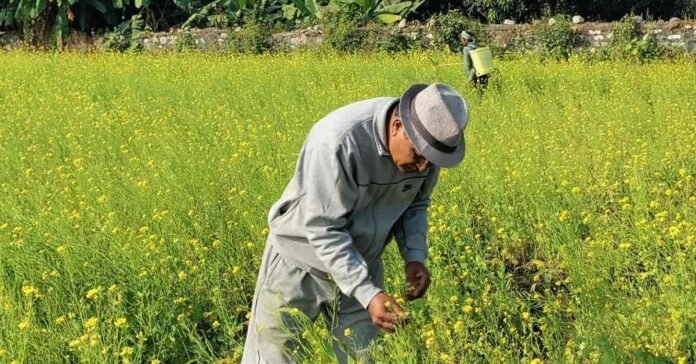
In the rolling hills of Nainital, a man stands knee-deep in the soil, his hands weathered by years of toil. With every crop he nurtures, every seed he collects, and every challenge he overcomes with ingenuity and dedication, 66-year-old Narendra Singh Mehra remains steadfast in his belief—farmers deserve recognition, and people deserve access to pure, healthy food.
Mehra, a farmer from Uttarakhand, has made an extraordinary contribution to Indian agriculture by pioneering a new variety of wheat that can thrive in diverse climates with minimal water. His relentless efforts have not only revolutionized wheat farming but also empowered small-scale farmers by promoting organic cultivation methods.
A Passion Rooted in the Soil
Born in 1959 in the village of Devla Malla, Nainital, Mehra grew up surrounded by agriculture. However, like many in his community, he was encouraged to pursue an education and leave farming behind. He earned degrees in geography, art, and tourism from the DSB Campus in Nainital. Yet, his deep-rooted love for the land drew him back to his ancestral fields. Taking over his family’s farmland, Mehra initially followed conventional farming practices, using pesticides and fertilizers to maximize yield.
Over time, he began to witness a disturbing trend—farmers were shifting towards cash crops like soybeans and tomatoes, abandoning traditional grain cultivation. This raised an alarming question in his mind: What will we eat if this trend continues?
The Discovery of a Game-Changing Wheat Variety
In 2008, while cultivating the RR21 wheat variety, Mehra noticed an unusual stalk of wheat—healthier, fuller, and more robust than the rest. Intrigued, he marked it with a red string and carefully saved its seeds. Over the next few years, he diligently replanted these seeds, determined to unlock their potential.

Despite initial setbacks, he persisted, gradually amassing a small stock of these non-hybrid, indigenous grains. Seeking expert validation, Mehra collaborated with agricultural institutions like the Krishi Vigyan Kendra and GB Pant Agricultural University. With the guidance of experts like Dr. SN Tiwari and Dr. JP Jaiswal, the wheat variety was eventually registered under the Protection of Plant Varieties and Farmers’ Rights Act (PPV&FRA).
Introducing ‘Narendra 09’: A Versatile, High-Yield Wheat Variety
Mehra’s wheat variety, later named Narendra 09, demonstrated remarkable adaptability, thriving in both mountainous and plain regions. Successfully cultivated in Mount Abu, Haryana, Uttar Pradesh, and beyond, it outperformed traditional varieties in both yield and resilience. While conventional wheat varieties typically produce 20–25 grains per stalk, Narendra 09 boasts an impressive 50–80 grains per stalk.
Farmers like 60-year-old Vinita Singh from Uttarakhand soon took notice. After learning about Mehra’s discovery through local news, she decided to cultivate Narendra 09 on her six-acre farm. “With commercial farming, each acre yields around 2,800–2,900 kg, far exceeding other crops in the region. Even when grown organically, the quality is exceptional,” she shares.
Sustainability and the Future of Indian Farming
A key advantage of Narendra 09 is its minimal water requirement, making it ideal for water-scarce regions. Farmers reported yields ranging from 1,800 to 2,500 kg per acre, significantly higher than conventional varieties. Encouraged by its success, Mehra distributed seeds to fellow farmers, initiating a ripple effect that transformed local agricultural practices.
Over time, he recognized the detrimental impact of chemical fertilizers and pesticides on soil health. This realization prompted him to advocate for organic farming, especially among small-scale sugarcane farmers in Uttarakhand. By reducing dependency on harmful chemicals, Mehra is helping farmers restore soil fertility and improve their livelihoods.
A Vision for the Future
Despite his groundbreaking achievements, Mehra remains humble and focused on his mission. “When a child is asked to draw a farmer, they usually depict struggle and hardship. I hope to change that image to one of pride,” he says.
Through his innovations in wheat cultivation and dedication to sustainable farming, Narendra Singh Mehra is not just transforming agriculture in Uttarakhand—he is inspiring a new generation of farmers to embrace the land with dignity and hope.

